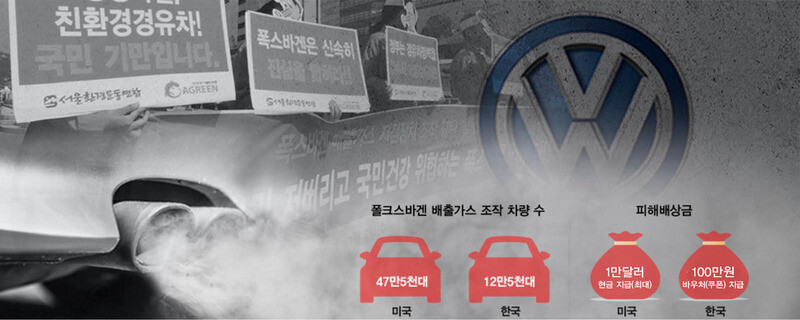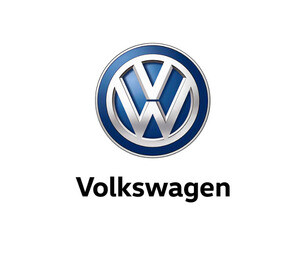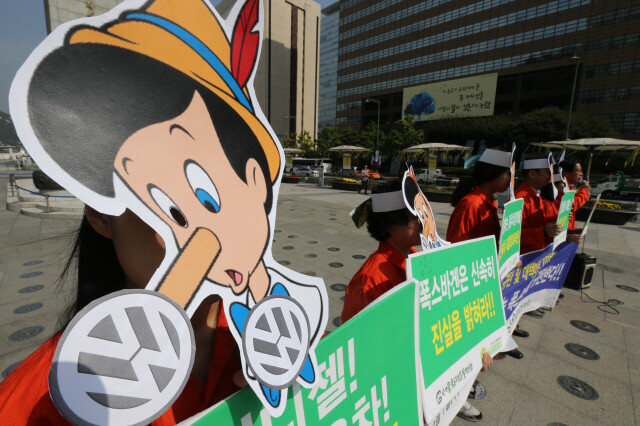hankyoreh
Links to other country sites 다른 나라 사이트 링크
VW resumes sales in South Korea without acknowledging emissions tampering

Volkswagen recently resumed sales in South Korea after they were suspended in the wake of the automaker’s “Dieselgate” scandal. It is set to begin its own sales shortly, on the heels of Volkswagen Group member Audi’s launch of the R8 Coupe sports car on Nov. 6.
Its resumption comes two years after a Ministry of Environment sales suspension over tampering with emissions readings. But the key issue of arbitrary manipulation of gas reduction devices has been buried, while compensation to consumers appears unlikely to happen. The situation stands in stark contrast with the US, where the company admitted its manipulations and produced a plan for astronomical compensation.
■ Huge compensation package in the US…

“It’s a case of fraud without precedent in automotive history,” said attorney Ha Jong-seon of the law firm Barun Law, which is spearheading the joint litigation over Dieselgate in South Korea. Ha is suing Volkswagen managers for fraud and demanding the “return of improper gains” on behalf of around 5,000 owners of Audi and Volkswagen owners.
“South Korean car owners are victims of fraud just like people in the US who purchased illegal vehicles that deliberately violated emissions standards, and they’re entitled the same compensation,” Ha said.
In the US, Volkswagen agreed last year to pay $14.7 billion in compensation to consumers – the equivalent of over 17 trillion won. The amount includes cash compensation to 475,000 car owners, as well as vehicle resale and repair costs. Volkswagen also has to pay large fines to the US government.
The amount of compensation continues to rise. CNN and Reuters recently reported that the compensation paid by Volkswagen had risen to US$30 billion with additional recall costs and civil and criminal fines. As of Nov. 19, the amounts to be paid by Volkswagen in the US include US$10 billion for buybacks from owners of vehicles with diesel engines; US$4.03 billion in federal civil and criminal fines; US$82 million in settlements to state governments; US$1.02 billion in dealer compensation; US$3.0 billion in additional hardware replacement costs; and US$4.07 billion in environmental decontamination and environment fund payments.
In contrast, Volkswagen’s response in South Korea has been the “We Care” campaign offering vouchers worth one million won (US$917) for its vehicles since February 2017. The campaign applies to all Volkswagen vehicles registered in South Korea through the end of 2016. In strict terms, it is intended as a service to customers inconvenienced in the wake of the Ministry of Environment’s decertification and suspension of sales – without any connection to the emissions tampering. From the ministry, the automaker suffered only 14.1 billion won (US$12.9 million) in penalties for violating the Clean Air Conservation Act. Compared to the astronomical compensation paid in the US, it could fairly be called a token payment.

■ OK to walk on “pushover” South Korea?
What accounts for the discrepancy between Volkswagen’s actions in South Korea and its response in the US, where it acknowledged responsibility and produced a massive compensation plan? At its root is its position that its responsibility in South Korea is merely ethical, not legal. Another factor is South Korea’s lack of powerful customer restitution measures like the US’s punitive damages system.
Under a class action lawsuit system, a legal victory for one victim means that all other consumers who suffered damages for the same reason are entitled to restitution without separate litigation. US courts also hand down enormous punitive compensation judgments on companies responsible for damages. Volkswagen’s decision to sign on to a settlement plan after being hit with a class action lawsuit over its emissions tampering was motivated by the enormous blow it stood to suffer if it lost.
Institutional measures for customer restitution and a strong response from the government go some way in explaining how US consumers were able to win such massive compensation from Volkswagen. South Korea also has a class action lawsuit system, but it is limited to the field of securities.
“The South Korean legal environment is structured in a way that benefits companies while being extremely unfavorable to consumers,” said one attorney. “We also need to ensure the punitive damages and class action lawsuit systems so that companies that act illegally have to take active steps to aid victimized consumers.”
A total of 125,000 of the Volkswagen vehicles at issue in the case were sold in South Korea. Experts argue that it was a clear attempt at deception: to earn environmental certification, Volkswagen attached exhaust gas recirculation (EGR) devices to its vehicles that functioned normally under indoor testing conditions but turned off during actual road travel. But Volkswagen has yet to acknowledge any illegal EGR tampering in South Korea as it has done in the US. Its argument is that the “arbitrary set-up” – the EGR software tampering – was legally problematic in the US, but not a violation in South Korea.
Volkswagen’s refusal to acknowledge the arbitrary set-up is rooted in issues of civil and criminal liability. An acknowledgement would amount to an admission of illegal tampering and leave it facing legal responsibility. The situation also explains why Volkswagen never referred to the “arbitrary set-up” in its recall plan, even after the Ministry of Environment rejected it three times.
■ “Customers should punish unethical companies”
In Oct. 2016, the Ministry of Environment began examining the recall plan’s suitability after notifying Volkswagen that it would regard a failure to respond on the arbitrary set-up as an acknowledgement of one. Volkswagen never did acknowledge the arbitrary set-up, but the ministry interpreted it as having done so. While it was apparently a last-ditch strategy to force a recall, it also relieved the automaker of the arbitrary set-up burden.
In the meantime, Audi-Volkswagen Korea CEO Johannes Thammer returned home to Germany ahead of trial after being indicted over the case; his position was taken over by Marcus Hellmann, who had been handling legal affairs at the head office. It’s a neat illustration of how the Volkswagen Group has treated South Korea.
In past year, the Asian region – China and South Korea in particular – has been the most notable sales market for Volkswagen. While it suffered a blow with its sales suspension in South Korea, import market trends suggest that it is likely to recover swiftly once sales resume in earnest. Last month, Volkswagen scored its best-ever performance for October with over 550,000 vehicles sold around the world. Its growth throughout the global market continues unaffected by the Dieselgate scandal. Experts suggested changes in import purchasing patterns are in order.
“In the end, it’s only consumers who can change misguided corporate practices,” said Daeduk College automotive engineering professor Lee Ho-geun.
“The most efficient way of pressuring an unethical company is through a movement by aware consumers,” Lee suggested.
By Hong Dae-sun, staff reporter
Please direct questions or comments to [english@hani.co.kr]

Editorial・opinion
![[Guest essay] The real reason Korea’s new right wants to dub Rhee a founding father [Guest essay] The real reason Korea’s new right wants to dub Rhee a founding father](https://flexible.img.hani.co.kr/flexible/normal/500/300/imgdb/original/2024/0423/8317138574257878.jpg) [Guest essay] The real reason Korea’s new right wants to dub Rhee a founding father
[Guest essay] The real reason Korea’s new right wants to dub Rhee a founding father![[Column] ‘Choson’: Is it time we start referring to N. Korea in its own terms? [Column] ‘Choson’: Is it time we start referring to N. Korea in its own terms?](https://flexible.img.hani.co.kr/flexible/normal/500/300/imgdb/original/2024/0423/3617138579390322.jpg) [Column] ‘Choson’: Is it time we start referring to N. Korea in its own terms?
[Column] ‘Choson’: Is it time we start referring to N. Korea in its own terms?- [Editorial] Japan’s rewriting of history with Korea has gone too far
- [Column] The president’s questionable capacity for dialogue
- [Column] Are chaebol firms just pizza pies for families to divvy up as they please?
- [Column] Has Korea, too, crossed the Rubicon on China?
- [Correspondent’s column] In Japan’s alliance with US, echoes of its past alliances with UK
- [Editorial] Does Yoon think the Korean public is wrong?
- [Editorial] As it bolsters its alliance with US, Japan must be accountable for past
- [Guest essay] Amending the Constitution is Yoon’s key to leaving office in public’s good graces
Most viewed articles
- 1[Guest essay] The real reason Korea’s new right wants to dub Rhee a founding father
- 2Why Korea shouldn’t welcome Japan’s newly beefed up defense cooperation with US
- 3Terry Anderson, AP reporter who informed world of massacre in Gwangju, dies at 76
- 4[Column] ‘Choson’: Is it time we start referring to N. Korea in its own terms?
- 5[Column] The clock is ticking for Korea’s first lady
- 6Opposition calls Yoon’s chief of staff appointment a ‘slap in the face’
- 7Senior doctors cut hours, prepare to resign as government refuses to scrap medical reform plan
- 8New AI-based translation tools make their way into everyday life in Korea
- 9[Editorial] Japan’s rewriting of history with Korea has gone too far
- 10[Column] Are chaebol firms just pizza pies for families to divvy up as they please?